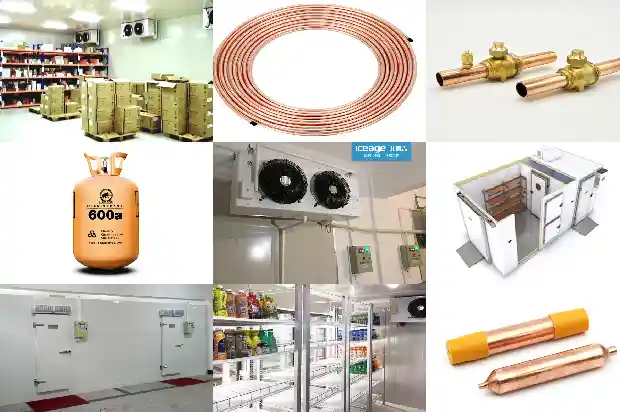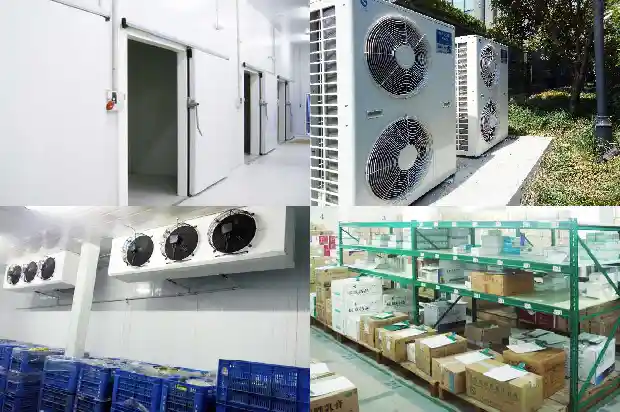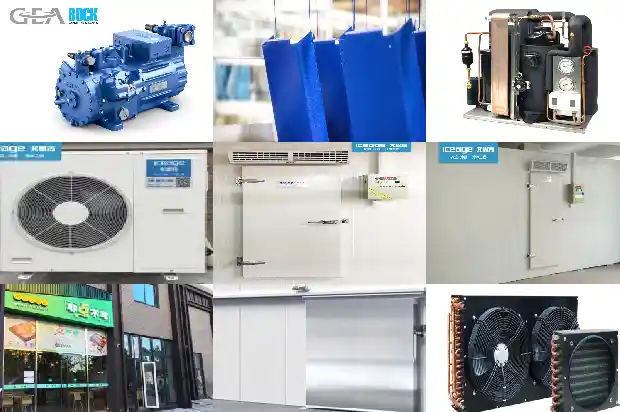How to Choose Between Water-cooled and Air-cooled Cold Storage?
2024-12-31
How to choose between air - cooled cold storage and water - cooled cold storage?
This question is easy to explain. For large - scale refrigeration systems, water - cooled cold storage is recommended. If it is a medium - small high - temperature cold storage, air - cooling is advisable. In fact, the choice of the refrigeration system should be based on the actual refrigeration needs and the size of the cold storage. So, let's briefly explain the selection of the refrigeration system.
The water - cooled cold storage and air - cooled cold storage are analyzed and compared from the system structure: Air - cooling (fan - cooling); the water - cooled unit adopts the cooling water cooling method; a water pump, a cooling tower and a circulation pipeline are used to cool the unit in a cycle. Cold storage is mainly used as a constant - temperature cold storage device for food, dairy products, meat, aquatic products, chemicals, pharmaceuticals, seedling cultivation, scientific experiments, etc. Therefore, an air - cooled unit only needs an air - cooled condenser, that is, a fan. A water - cooled chiller needs a cooling tower, a water pump and a circulation pipeline. The structure of the water - cooled system is much more complex than that of the air - cooled system.
Take the Zell medium - high - temperature compressor 4NCS20.2 as an example. When the evaporation temperature is 0℃ and the condensing temperature is 50℃, the cooling capacity of a 20HP unit is 13.65kW. Under the same working conditions, the cooling rate of the water - cooled system is 44.5kW and the power is 12.
The annual comprehensive cost of the air - cooled refrigeration unit is lower than that of the water - cooled unit. But if the water - cooled system is properly managed and the water supply is controlled below 3%, the annual cost of the water - cooled unit is lower than that of the air - cooled unit. This utility model adopts the air - cooling method, which not only saves the cooling tower, cooling water pump and pipeline system required by the cooling water system, but also avoids the condensation of the condenser and the blockage of water pipes in areas with poor water quality, thus saving water resources.
It is currently the most economical and simplest type of water - cooled cold storage among refrigeration equipment products: For an open - type cooling water system, since the cooling water absorbs heat and comes into contact with the air, CO2 escapes into the air, and the dissolved oxygen and turbidity in the water increase, resulting in four major problems in the cooling water system, such as corrosion, scaling, bacteria and algae reproduction, and sludge. If the water quality is not treated, it will seriously damage the refrigeration equipment, greatly reduce the heat transfer efficiency and waste energy. Therefore, it is very important to carry out corrosion inhibition, scale prevention and antibacterial treatment on the system water.
The annual water treatment cost is high, and it is impossible to achieve a 100% descaling effect. The quality of the cooling water is the key. If the water quality is not treated, the refrigeration equipment and efficiency will be seriously damaged.
The longer the annual running time of the refrigeration unit, the more advantageous the air - cooling method is. The units used for refrigeration in southern regions are more suitable for air - cooled units. From the perspective of cooling conditions, the high wet - bulb temperature in southern regions is also not conducive to water - cooled units. The re - hydration amount of the cooling water of the water - cooled unit is an important factor affecting the cost of the cooling water. The analysis shows that the energy consumption of the evaporative condenser, the air - cooled condenser and the water - cooled condenser A - type evaporative condenser is about 1/2 compared with that of the air - cooled and water - cooled condensers. The circulating water only accounts for one - quarter of the cooling water volume.
This question is easy to explain. For large - scale refrigeration systems, water - cooled cold storage is recommended. If it is a medium - small high - temperature cold storage, air - cooling is advisable. In fact, the choice of the refrigeration system should be based on the actual refrigeration needs and the size of the cold storage. So, let's briefly explain the selection of the refrigeration system.
The water - cooled cold storage and air - cooled cold storage are analyzed and compared from the system structure: Air - cooling (fan - cooling); the water - cooled unit adopts the cooling water cooling method; a water pump, a cooling tower and a circulation pipeline are used to cool the unit in a cycle. Cold storage is mainly used as a constant - temperature cold storage device for food, dairy products, meat, aquatic products, chemicals, pharmaceuticals, seedling cultivation, scientific experiments, etc. Therefore, an air - cooled unit only needs an air - cooled condenser, that is, a fan. A water - cooled chiller needs a cooling tower, a water pump and a circulation pipeline. The structure of the water - cooled system is much more complex than that of the air - cooled system.
Take the Zell medium - high - temperature compressor 4NCS20.2 as an example. When the evaporation temperature is 0℃ and the condensing temperature is 50℃, the cooling capacity of a 20HP unit is 13.65kW. Under the same working conditions, the cooling rate of the water - cooled system is 44.5kW and the power is 12.

The annual comprehensive cost of the air - cooled refrigeration unit is lower than that of the water - cooled unit. But if the water - cooled system is properly managed and the water supply is controlled below 3%, the annual cost of the water - cooled unit is lower than that of the air - cooled unit. This utility model adopts the air - cooling method, which not only saves the cooling tower, cooling water pump and pipeline system required by the cooling water system, but also avoids the condensation of the condenser and the blockage of water pipes in areas with poor water quality, thus saving water resources.
It is currently the most economical and simplest type of water - cooled cold storage among refrigeration equipment products: For an open - type cooling water system, since the cooling water absorbs heat and comes into contact with the air, CO2 escapes into the air, and the dissolved oxygen and turbidity in the water increase, resulting in four major problems in the cooling water system, such as corrosion, scaling, bacteria and algae reproduction, and sludge. If the water quality is not treated, it will seriously damage the refrigeration equipment, greatly reduce the heat transfer efficiency and waste energy. Therefore, it is very important to carry out corrosion inhibition, scale prevention and antibacterial treatment on the system water.
The annual water treatment cost is high, and it is impossible to achieve a 100% descaling effect. The quality of the cooling water is the key. If the water quality is not treated, the refrigeration equipment and efficiency will be seriously damaged.


The longer the annual running time of the refrigeration unit, the more advantageous the air - cooling method is. The units used for refrigeration in southern regions are more suitable for air - cooled units. From the perspective of cooling conditions, the high wet - bulb temperature in southern regions is also not conducive to water - cooled units. The re - hydration amount of the cooling water of the water - cooled unit is an important factor affecting the cost of the cooling water. The analysis shows that the energy consumption of the evaporative condenser, the air - cooled condenser and the water - cooled condenser A - type evaporative condenser is about 1/2 compared with that of the air - cooled and water - cooled condensers. The circulating water only accounts for one - quarter of the cooling water volume.
Related Articles
- Basic Faults and Preventive Maintenance of Water - cooled Units
- Three Common Methods for Removing Water Scale from Water - cooled Condensers
- What Are the Differences Between Chillers and General Water - cooled Equipment?
- Selection of Bypass Control Valves for Air - conditioning Water Systems
- Operation of Screw - type Water - cooled Chiller Units
- Characteristics and Differences among Water System, Air System and Refrigerant System
- Accident Handling and Precautions for Circulating Water Pumps
- Startup, Shutdown and Accident Handling of Jet Water Pump
- How to Select and Use Water Pumps for Air - conditioning Systems?
- Introduction to Various Water Tanks in Air - conditioning Systems
- For Computer Room Air Conditioners, Besides Air - cooled and Water - cooled, What Other Cooling Methods Are There?
- Refrigeration System Failures: Handling System Blockages and Water Infiltration
- Both are dual - connected systems. How to choose between air - fluorine - ground - water and air - water - ground - water systems after all?
- Precautions for the Installation and Use of Water Flow Switches
- Water Flow Control Technology for Small Air-cooled Hot and Cold Water Units
- How to accurately choose water-cooled and air-cooled chillers?
- 4 Points on Causes of Water Leakage in Closed Cooling Towers
- Water-cooled Screw Chiller: Operation and Maintenance
